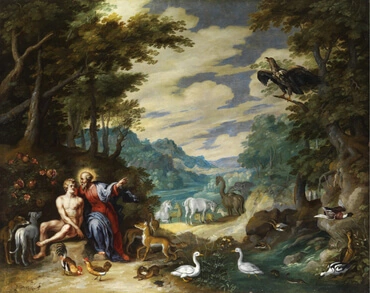1
Und der Mensch erkannte Eva, sein Weib, und sie ward schwanger und gebar Kain; (Erworbenes, Gewinn) und sie sprach: Ich habe einen Mann erworben mit Jehova.
2
Und sie gebar ferner seinen Bruder, den Abel. (H. Hevel: Hauch, Nichtigkeit) Und Abel wurde ein Schafhirt, (W. Kleinviehhirt) und Kain wurde ein Ackerbauer.
3
Und es geschah nach Verlauf einer Zeit, da brachte Kain dem Jehova eine Opfergabe von der Frucht des Erdbodens;
4
und Abel, auch er brachte von den Erstlingen seiner Herde (Eig. seines Kleinviehs) und von ihrem Fett. Und Jehova blickte auf Abel und auf seine Opfergabe;
5
aber auf Kain und auf seine Opfergabe blickte er nicht. Und Kain ergrimmte sehr, und sein Antlitz senkte sich.
6
Und Jehova sprach zu Kain: Warum bist du ergrimmt, und warum hat sich dein Antlitz gesenkt?
7
Ist es nicht so, daß es sich erhebt, wenn du wohl tust? (W. Ist nicht, wenn du wohl tust, Erhebung? Vergl. Hiob 11,15) Und wenn du nicht wohl tust, so lagert die Sünde (Viell.: ein Sündopfer; das hebräische Wort bedeutet beides) vor der Tür. Und nach dir wird sein Verlangen sein, du aber wirst über ihn herrschen.
8
Und Kain sprach zu seinem Bruder Abel; und es geschah, als sie auf dem Felde waren, da erhob sich Kain wider seinen Bruder Abel und erschlug ihn.
9
Und Jehova sprach zu Kain: Wo ist dein Bruder Abel? Und er sprach: Ich weiß nicht; bin ich meines Bruders Hüter?
10
Und er sprach: Was hast du getan! Horch! Das Blut deines Bruders schreit zu mir (W. Stimme des Blutes deines Bruders, das zu mir schreit) vom Erdboden her.
11
Und nun, verflucht seiest du von dem Erdboden hinweg, der seinen Mund aufgetan hat, das Blut deines Bruders von deiner Hand zu empfangen!
12
Wenn du den Erdboden bebaust, soll er dir hinfort seine Kraft nicht geben; unstet und flüchtig sollst du sein auf der Erde.
13
Und Kain sprach zu Jehova: Zu groß ist meine Strafe, um sie zu tragen. (O. meine Missetat, um vergeben zu werden)
14
Siehe, du hast mich heute von der Fläche des Erdbodens vertrieben, und ich werde verborgen sein vor deinem Angesicht und werde unstet und flüchtig sein auf der Erde; und es wird geschehen: wer irgend mich findet, wird mich erschlagen.
15
Und Jehova sprach zu ihm: Darum, jeder, der Kain erschlägt siebenfältig soll es gerächt werden. Und Jehova machte an Kain ein Zeichen, auf daß ihn nicht erschlüge, wer irgend ihn fände.
16
Und Kain ging weg von dem Angesicht Jehovas und wohnte im Lande Nod, (Flucht) östlich von Eden.
17
Und Kain erkannte sein Weib, und sie ward schwanger und gebar Hanoch. Und er baute eine Stadt und benannte die Stadt (W. er wurde ein Stadtbauer) nach dem Namen seines Sohnes Hanoch.
18
Und dem Hanoch wurde Irad geboren; und Irad zeugte Mehujael, und Mehujael zeugte Methusael, und Methusael zeugte Lamech.
19
Und Lamech nahm sich zwei Weiber; der Name der einen war Ada, und der Name der anderen Zilla.
20
Und Ada gebar Jabal; dieser war der Vater der Zeltbewohner und Herdenbesitzer. (Eig. derer, die in Zelten und unter Herden wohnen)
21
Und der Name seines Bruders war Jubal; dieser war der Vater aller derer, welche mit der Laute (Nicht unsere heutige Laute, sondern eine Art Leier; so auch später, wo das Wort vorkommt) und der Flöte umgehen.
22
Und Zilla, auch sie gebar Tubalkain, einen Hämmerer von allerlei Schneidewerkzeug aus Erz und Eisen. Und die Schwester Tubalkains war Naama.
23
Und Lamech sprach zu seinen Weibern: Ada und Zilla, höret meine Stimme; Weiber Lamechs, horchet auf meine
ede! Einen Mann (O. Fürwahr, einen Mann) erschlug (O. erschlage) ich für meine Wunde und einen Jüngling für meine Strieme!
24
Wenn Kain siebenfältig gerächt wird, so Lamech siebenundsiebzigfältig.
25
Und Adam erkannte abermals sein Weib, und sie gebar einen Sohn und gab ihm den Namen Seth; (H. Scheth: Ersatz) denn Gott hat mir einen anderen Samen gesetzt an Stelle Abels, weil Kain ihn erschlagen hat.
26
Und dem Seth, auch ihm wurde ein Sohn geboren, und er gab ihm den Namen Enos. (H. Enosch: Mensch, mit dem Nebenbegriff: schwach, hinfällig) Damals fing man an, den Namen Jehovas anzurufen.







